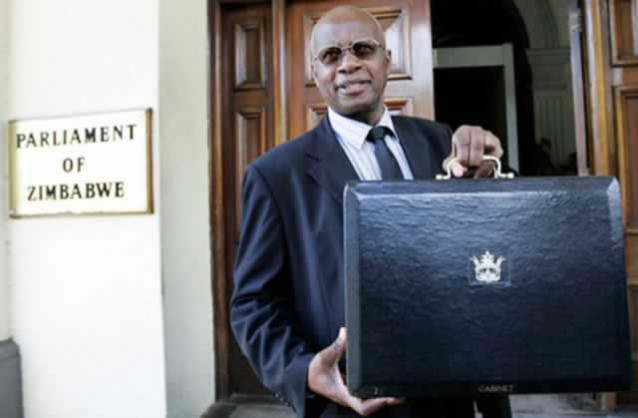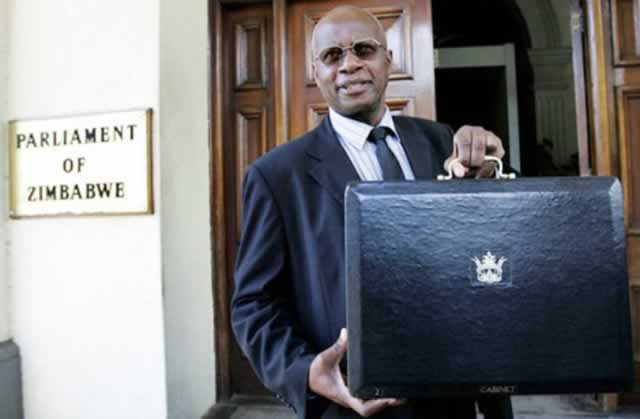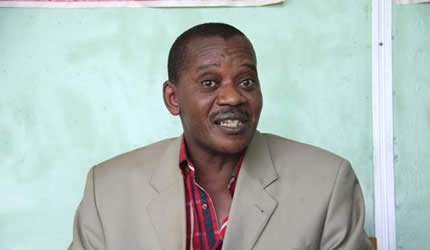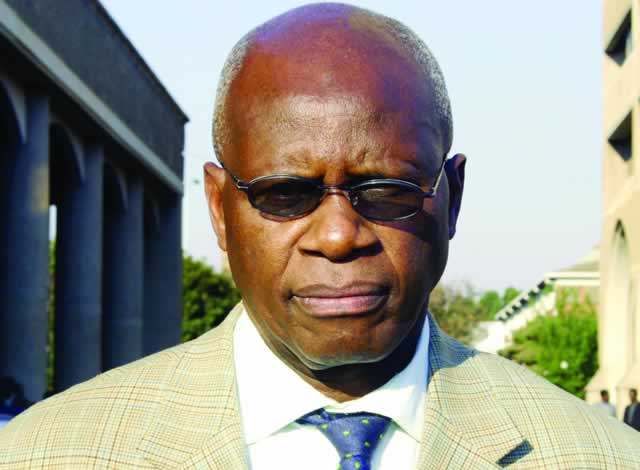Chinamasa has his work cut out for him


FLASHBACK. . . Then Acting Finance Minister Chinamasa poses for a photo before presenting the 2009 National Budget
Takunda Mugaga Economic Agenda
ECONOMISTS are an argumentative bunch. In 2009, many countries notably in the West rolled out big packages of tax cuts and extra spending in the hope of buoying growth.
Among Barack Obama’s first steps as president in 2009 was to sign the American Recovery and Reinvestment Act, a stimulus plan worth US$831 billion, or almost 6 percent of that year’s GDP, most of it to be spent over the next three years.
Zimbabwe is at a stage when the fiscal policy has to be as loud as it can be with the levers of monetary policies having been relaxed by default; Minister Patrick Chinamasa is expected to present his purse to the nation next month amid an L-recovery mode the economy is immersed in.
When there is a slack in the economy, fiscal stimulus can be particularly powerful thanks to a “multiplier effect”.
A dollar spent building a school, for example, might go to the wages of a construction worker. He then spends the extra income on groceries, enriching a shopkeeper, who in turn goes shopping himself and so on.
This makes the whole argument of indigenisation sweet because the propensity of spending such money domestically is relatively higher than if a foreigner was running the grocery.
The public finance management policies of Zimbabwe require a serious revamp with the failure by the Budget to tweak the employment trends and manufacturing sector growth a cause for concern.
Indeed, the Budget Statement will be announced soon and whether it will make a significant difference with the last Budget statements in this dollarised environment is yet to be seen.
However, it must not be the prerogative of the new Treasury boss to pressure himself, as the public finances need an adjustment in terms of how to consolidate the new income tax law, making national borders less porous as well as stamping the steep marginal propensity by both the corporates and individuals to avoid tax.
Supporters of fiscal manoeuvres to drive the economy look to the ideas of John Maynard Keynes, a British economist.
He argues that firms and families might save too much because of financial uncertainty or because they are rushing to “deleverage”, to reduce the ratio of their debts to their assets.
With the misaligned loan to deposit ratio for most banks following dollarisation, most households are in a quandary which leaves them with a greater appetite to shun paying tax as it seems to be an opportunity cost to their ability to honour their commitments with the banks, this leaves an interesting relationship between banking assets and fiscal space the Government can create.
The minister is possibly expected to tackle issues to do with a disproportional Budget where recurrent expenditure continues forming the core of the statement, the Budget is slowly becoming a bonus Budget as it appears to accommodate the rising wage demands by the already underpaid civil sector.
Interestingly, about 60 percent of the nation’s expenditure portion only caters for less than 10 percent of the population as extrapolated from the less than 200 000 civil servants who are on the Government payroll against unemployment figure of about 80 percent.
To handle such an anomaly might call for civil sector reform notably in the teaching and nursing profession where the coincidental result of “double dipping” is common.
Most teachers who are employed by the Government also partake in the private sector as they are paid twice.
We do not understand why the Government does not increase the enrolment of new teachers while those earning salaries from the private sector will open up space for others.
Austerity, in short, still has its place. But what sort? Whereas some economists recommend spending cuts as news of profligacy on vehicles and travel expenditures for out of the country trips are often mentioned, other research indicates that higher taxes can also work. Both approaches have costs. Taxing pay can distort labour markets and widen the informal sector as is the case in all cities of Zimbabwe, consumption taxes can lead to inflation. Yet cutting spending is more unpopular and can exacerbate inequality.
The IMF staff-monitored programme is expected to continue, the immense benefits to be derived just from mere approval by such institutions opens opportunities for the nation. Zimbabwe’s image has been battered by unjustified sentiments which had been peddled by such revered institutions which left us losing the battle to attract foreign capital to once shadow economies such as Kenya, Zambia and Angola. A depressed trade deficit as well as budget deficit is anathema to significant GDP growth and it is high time the Budget should outline confidence building measures and arrest the continuing free-fall of macro-economic variables of that sort. The social safety nets are pertinent fully knowing that most Zimbabweans are exposed to the usurious levels of health inflation. The allocation to the health ministry must be high enough to see conditions at referral and district hospitals improving.
A new class of bourgeois physicians is cropping up every day whose specialist knowledge could not be felt by ordinary citizens. Our hospitals need a facelift and the ratio of nurse-to-patient is still gloomy regardless of the greater percentage of unemployed nurses and other health professionals.
Appointments for a medical check-up with doctors in our hospitals are getting longer than even those to meet senior bureaucrats in our society. The Budget has to address this. The trade measures to limit on imports might be mistimed if they are to be implemented soon, the failure by the industry to reach at least 50 percent capacity utilisation means the support from foreign markets is still intact.
Unless the Government opts for the widening of its tax base, I do not see why they will block the importation of most commodities which we use every day. Indeed, it is common practice in most developing countries to utilise tariff measures as a source of revenue for their economies. However, with the porosity of our borders through corruption and smuggling of goods, this might backfire in the end.
Christopher Takunda Mugaga is an economist and Head of Research for Econometer Global Capital, a regional finance and economics research firm. He can be contacted on +263 772 340 353 / +263 776 266 062 or [email protected].










Comments